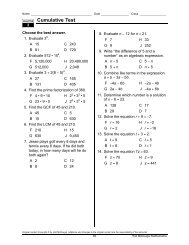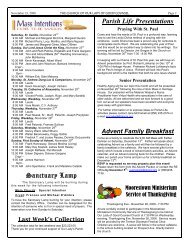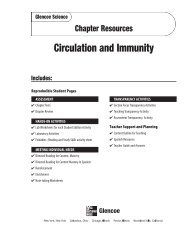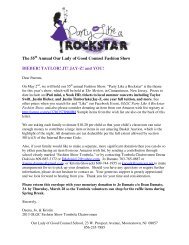Chapter 3 Resource: Interactions of Human Systems
Chapter 3 Resource: Interactions of Human Systems
Chapter 3 Resource: Interactions of Human Systems
Create successful ePaper yourself
Turn your PDF publications into a flip-book with our unique Google optimized e-Paper software.
Name Date Class<br />
2<br />
Enrichment<br />
Enzymes and Coenzymes<br />
Meeting Individual Needs<br />
Our bodies require energy to live. To get that<br />
energy from the food we eat, the food must first<br />
be processed by our digestive system, then<br />
absorbed by all <strong>of</strong> our cells. Our bodies perform<br />
two types <strong>of</strong> digestion simultaneously: physical<br />
breakdown and chemical breakdown. Physical<br />
breakdown is smashing food into smaller pieces.<br />
Chemical breakdown involves separating the<br />
molecules in the food and then digesting, or<br />
breaking apart, the bonds the molecules contain.<br />
Essential to chemical digestion are many<br />
enzymes that help perform molecular digestion<br />
at various stages <strong>of</strong> the digestive process.<br />
Shaping Up<br />
Each enzyme has a unique number <strong>of</strong> atoms<br />
and a unique shape. The shape <strong>of</strong> the enzyme<br />
determines it’s function. For example, amylase is<br />
an enzyme that helps break down starches. The<br />
enzyme and the starch fit together like two puzzle<br />
pieces, each fitting exactly only with the<br />
other. However, enzymes require other molecules<br />
to ensure proper activity. These molecule<br />
are called coenzymes.<br />
Many coenzymes are vitamins. If a person is<br />
not consuming a proper diet, complete with all<br />
vitamins and minerals, certain enzyme<br />
processes may not function properly. Many<br />
medical problems are linked with low levels, or<br />
even the absence, <strong>of</strong> certain enzymes.<br />
1. What is the function <strong>of</strong> a digestive enzyme<br />
A condition known as lactose intolerance is a<br />
common condition in which a body can’t digest<br />
lactose, the sugar in milk products. If a person<br />
lacks the lactose-digesting enzyme, lactase, that<br />
person may need to reduce or eliminate milk<br />
products from his or her diet, or possibly take<br />
enzyme supplements. While lactose intolerance<br />
is not life threatening, it causes increased gas<br />
production, upset stomach, or intestinal distress.<br />
Serious Problems<br />
Some enzyme deficiencies, such as Gaucher’s<br />
disease, can be more serious. This disease is<br />
caused by a deficiency in the enzyme that<br />
digests glycolipids (glucose combined with fats<br />
or oils). Without this enzyme, blood levels <strong>of</strong><br />
glycolipids can increase and cause serious problems.<br />
These problems may include an enlarged<br />
spleen and liver, anemia (low blood oxygen),<br />
and severe bone and joint pain.<br />
For those people who have enzyme deficiencies,<br />
identified by a physician, enzyme supplements<br />
<strong>of</strong>fer one possible treatment. Most<br />
medical pr<strong>of</strong>essionals agree, however, that<br />
healthy people manufacture all the enzymes<br />
they require, so supplements are not necessary.<br />
Further, most digestive problems are correctable<br />
by making sure a proper diet is consumed that<br />
provides the body with all the nutrients it needs<br />
to maintain the right levels <strong>of</strong> enzyme activity.<br />
2. What gives enzymes the ability to digest the molecules they are supposed to digest<br />
3. A person may show symptoms <strong>of</strong> reduced enzyme function. Explain how this may be caused<br />
by a vitamin or mineral deficiency.<br />
4. How do you think digestive enzymes assist the body in maintaining overall homeostasis<br />
Copyright © Glencoe/McGraw-Hill, a division <strong>of</strong> the McGraw-Hill Companies, Inc.<br />
32 <strong>Interactions</strong> <strong>of</strong> <strong>Human</strong> <strong>Systems</strong>
















